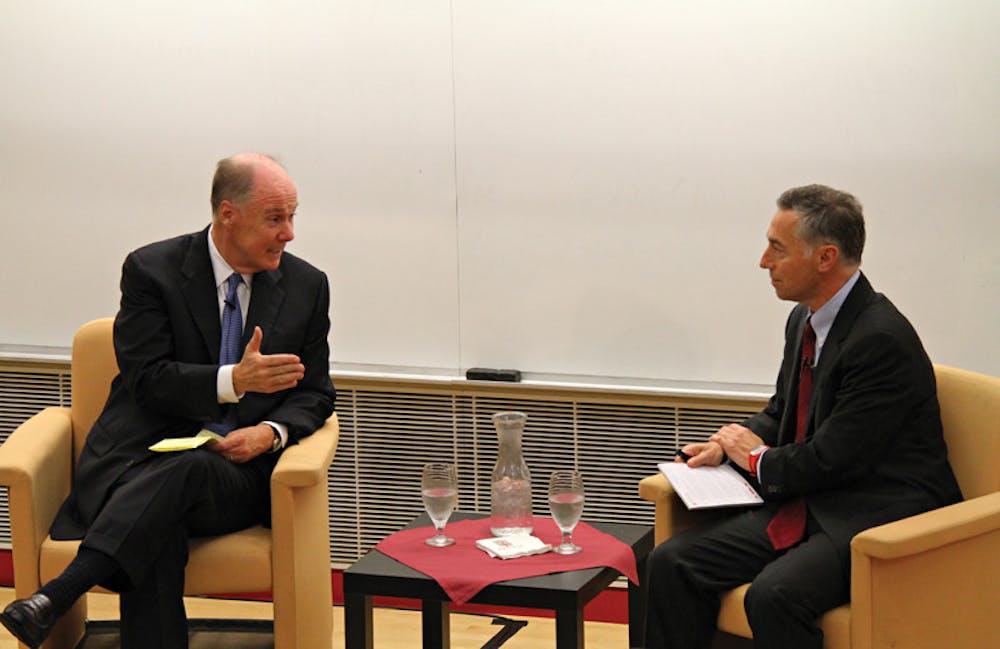Talk of the government shutdown and American foreign policy dominated a Monday evening event that featured President Obama’s former adviser Thomas Donilon — with Donilon saying a prolonged government shutdown could severely damage the country’s economy and credibility.
In a conversational format, Donilon, who previously served as National Security Adviser, answered questions posed by Richard Locke, director for the Watson Institute for International Studies. Donilon touched on U.S. foreign policy around the world, including the Middle East, North Africa and Asia. A mix of students, local and national political figures and Providence residents listened intently and later engaged with Donilon in a question-and-answer session.
Donilon provoked laughter from the audience when he referred to the current government shutdown as “the goings on in Washington.” He continued to examine the effects the shutdown could have and is currently having on U.S. foreign policy and relations.
“One of the fallouts of failing to adopt a budget is that the president wasn’t able to take this trip that Secretary of State Kerry is on,” Donilon said of a trip to negotiate a trade deal that could involve up to 60 percent of the world’s gross domestic product. “It would have been better for him to be there,” Donilon said.
When asked by an audience member about the potential effects of an extended government shutdown, Donilon said the United States has never defaulted on its debt, and “that’s important for the trust that the world has in the (United States) and its currency.” Were the United States to default, it would increase the cost of borrowing and send the nation’s economy back into recession, Donilon said, adding that defaulting would be “a deeply disturbing thing to do to the world.”
Donilon also spoke of conflict in countries such as Syria, saying, “The situation in Syria is a really incredible tragedy.” He suggested that the violent response of the Assad regime to the initially peaceful protests elevated the conflict and turned it into a sectarian issue.
Donilon compared the Syrian conflict to what happened in Iraq but said it is good that the situation is being dealt with diplomatically instead of militarily.
In the question-and-answer portion of the event, Donilon answered a question about the recently released NSA intelligence gathering policies, calling them “very important in protecting the country.”
“No intentional example of abuse has been disclosed,” he said.
“The country’s made a lot of progress in integration of intelligence agencies” since the alleged intelligence failures leading up to the 9/11 attacks, Donilon said.
Donilon said a counterterrorism model is important because it shows enemies “you can run, but you can’t hide.”
In foreign policy analysis, Donilon stressed the importance of deciding “where we are overinvested and where we are underinvested.” At the beginning of Obama’s first term, the United States was “overinvested in military operations in the Middle East and very underinvested in Asia,” Donilon said.
The result of these analyses involved increased focus in several Asian countries, including Singapore, South Korea and China.
“We need to engage constructively and productively with the Chinese,” Donilon said. Since Obama took office, he has met with Chinese President Hu Jintao 12 times, half as many meetings as occurred between 1979 and 2009.
Donilon spoke at length of the national security briefing process, which is one of the first things the president does each day.
“The first part of the meeting was a review of key intelligence that came in overnight,” Donilon said, adding that he expanded the conversation to be a policy discussion in which he led responses to some of the intelligence.
In preparing for these briefings, Donilon said he had to learn to anticipate Obama’s questions about how to respond to different pieces of intelligence.
Donilon finished the conversation by discussing opportunities and challenges he said face the United States. Donilon said a key challenge is the continuation of the economic recovery, though he said “compared to the rest of the world, we are doing better, but not well enough.”
Donilon called nuclear proliferation another crucial issue the United States faces, especially in Iran and North Korea. Donilon said progress in Iran is currently more plausible than in North Korea, given Iran’s recent elections and new president’s desire “to get his country out from under sanctions.”
Donilon said, moving forward, “the next step is to have United Nations inspectors come in and actually begin dissembling” Iran’s nuclear facilities.
On the positive side, Donilon listed innovation, corporations, higher education and energy sources as areas for the United States to focus on. The United States is set to be the largest oil producer in the world by the end of the decade and is already the largest natural gas exporter, Donilon said.
In the question-and-answer session, Donilon answered questions about Russia, integration of intelligence agencies, China, careers in public policy, Iran and the government shutdown.
Though the United States and Russia were headed in the right direction, a combination of Putin’s election and “lots of anti-U.S. rhetoric in the election in the spring of 2012” had detrimental effects on the tone of relations between the two countries, Donilon said.
Alex Mechanick ’15, a double concentrator in economics and philosophy, asked Donilon how students can prepare for careers in public policy. Donilon said there are “a lot more ways to get involved in politics and policy now than there were” in years past.
He ended by stressing the importance of reading history to understand the present and inform decision-making.
Mechanick, who said he attended because he “would love to have a career in public policy” and admires Donilon’s success, said Donilon took “no bold positions,” but it was “great to hear Donilon’s perspectives.”
Donilon came to Brown as a speaker in the Watson Distinguished Speaker Series, which is intended to bring speakers from government, the private sector and academia “to speak about pressing issues of the day,” Locke said.

ADVERTISEMENT




